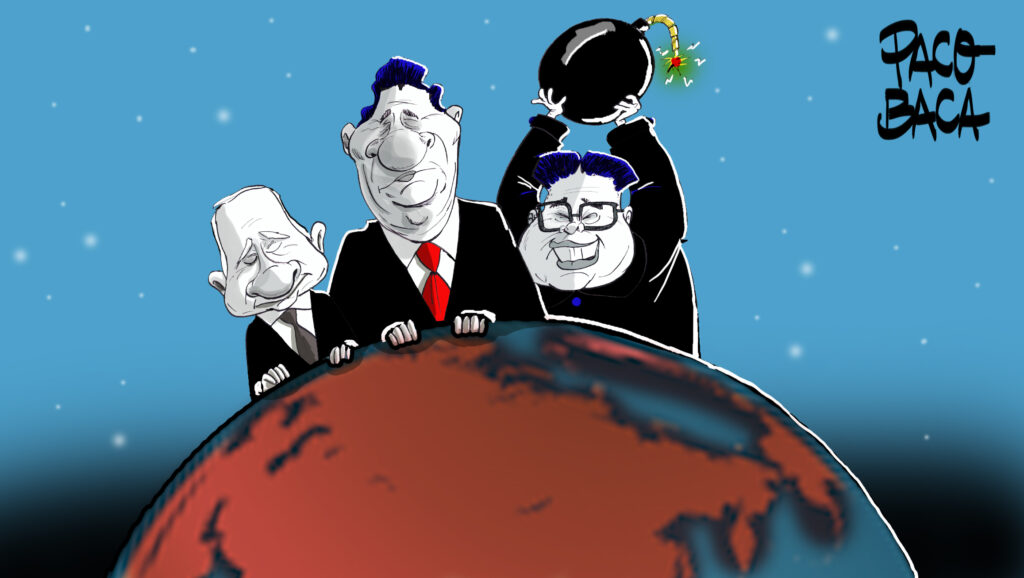Paco Baca.
U.S. Names Global Threats for 2024.
Intelligence Report.
Artificial intelligence, Russia and China, are just a few of the threats listed in the new report.

Who would win a war against this powerful intercontinental alliance?
The U.S. intelligence community, in its 2024 report on global threats, placed a strong emphasis on an «ambitious but eager» China and a «confrontational» Russia.
«Over the next year, the United States faces an increasingly fragile and strained global order from accelerating strategic competition among major powers, more intense and unpredictable transnational challenges, and multiple regional conflicts with far-reaching implications,» according to the U.S. intelligence community’s annual threat assessment released this week. Avril Haines, the director of national intelligence, told Congress on Tuesday that the U.S. «faces an increasingly complex and interconnected threat environment.»
He named three categories of challenges: the acceleration of strategic competition with major authoritarian powers, the intensification and unpredictability of transnational challenges, and regional and localized conflicts with far-reaching effects.
«And all three challenges are affected by trends in new and emerging technologies, environmental changes, and economic strain, which are stoking instability and making it much more difficult for us to forecast developments and their implications,» Haines said during a committee hearing.
The assessment is not intended to be an exhaustive assessment of all global challenges.
«It addresses traditional and non-traditional threats from U.S. adversaries, a range of regional issues with potentially larger global implications, as well as functional and transnational challenges, such as proliferation, emerging technology, climate change, terrorism, and illicit drugs,» the U.S. intelligence community wrote in the report.

The growth of the military industry and war technology is increasingly sophisticated when alliances between powerful economic partners reveal the degree of war development that increases in the exchange of technology applied to war.
Here are the three main challenges:
Here are the three main challenges:
Haines said the major authoritarian powers «are actively working to undermine the rules-based order and open international system that the United States and our partners rely on for trade, the free flow of information, and accountability with truth.»
He specifically named China and Russia as two players.
«We hope that [the People’s Liberation Army] will deploy more advanced platforms, deploy new technologies, and become more proficient in joint operations with a particular focus on Taiwan and the Western Pacific,» Haines said.
«The envisioned role for China’s growing nuclear forces and cyber capabilities in this effort and the ultimate intent behind unprecedented growth in these areas remain priorities for us in the [intelligence community], and are not unrelated to actions in Russia.» Haines.
Ukraine’s territorial losses in recent weeks «have exposed the erosion of Ukraine’s military capabilities and the diminishing availability of external military aid,» according to Haines.
«The assistance contemplated in the supplement is absolutely critical to Ukraine’s defense at this time,» he said of the Biden administration’s proposed funding for Ukraine that has stalled in Congress. «And without that help, it’s hard to imagine how Ukraine will be able to sustain the gains it has made with so much effort against the Russians, especially given the sustained increase in Russian ammunition production and purchases from North Korea and Iran.»
Russian President Vladimir Putin «continues to judge that time is on his side and almost certainly assumes that a larger, better-equipped military will also serve to drive that point home to Western audiences,» Haines added.
He said the U.S. intelligence community is monitoring evolving relations between the governments of Russia, North Korea, China and Iran as they prove more willing to cooperate with each other on military, economic, political and intelligence matters. These actions «further undermine the rules-based order and give each of them a certain insulation from external international pressure.» But the intelligence community assesses that these relationships remain «far below» any kind of formal alliance.
Increasingly intense and unpredictable transnational challenges
According to Haines, these challenges include «climate change, corruption, narcotics trafficking, health, security, terrorism, and cybercrime.»
Specifically, Haines pointed to artificial intelligence and ransomware attacks, which are on the rise globally, with U.S. entities being the most targeted.
He further noted that transnational criminal organizations and human smuggling operations fall into this category, adding that they increasingly exploit migrants through extortion, kidnapping, and human trafficking.
Regional and localized conflicts
Haines emphasized the crisis in Gaza as a «clear example of how regional developments have the potential to have broader and even global implications.»
«Having lasted longer than budgeted, the Gaza conflict has rocked the Middle East with renewed instability, presenting new security paradigms and humanitarian challenges, while attracting a range of actors,» he said.

After Netanyahu’s warning, Iran renews its vow to «punish» Israel for the attack in Syria
The intelligence community continues to assess that Hezbollah and Iran do not want a wider conflict. But the Houthis, he said, have become «one of the most aggressive actors in the conflict.» The implications could be widespread.
«In addition, the crisis has succeeded in amalgamating violence in a number of actors around the world, and while it is too early to tell, the Gaza crisis is likely to have a generational impact on terrorism,» Haines said.
This intelligence report begs the question, how controlled is the world stage that we are able to anticipate any eventuality?
The world is not at this moment to neglect any scenario, this chess is getting complicated, the next move will be castling, and unlocking it can lead to unimaginable consequences.

THREE SOME… A Paco Baca cartoon